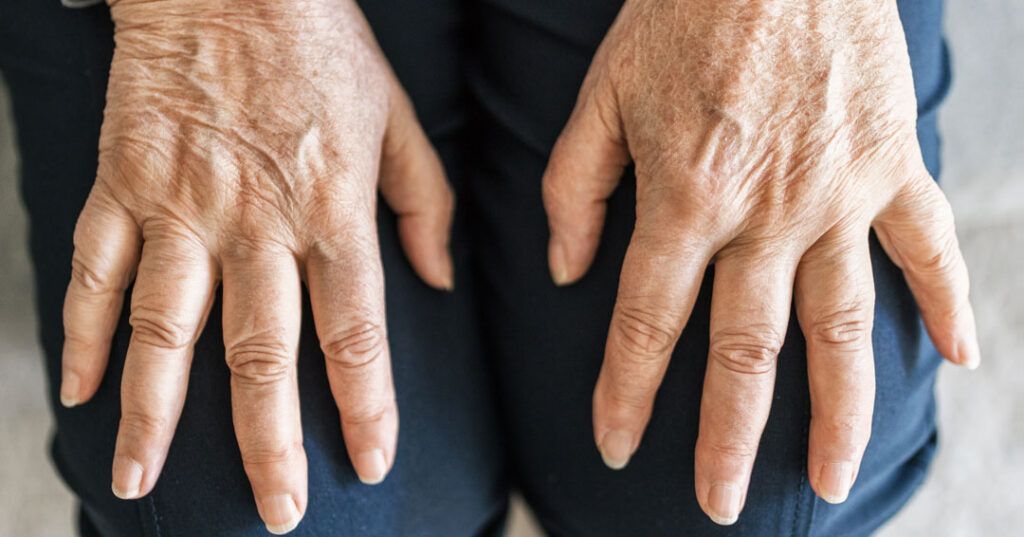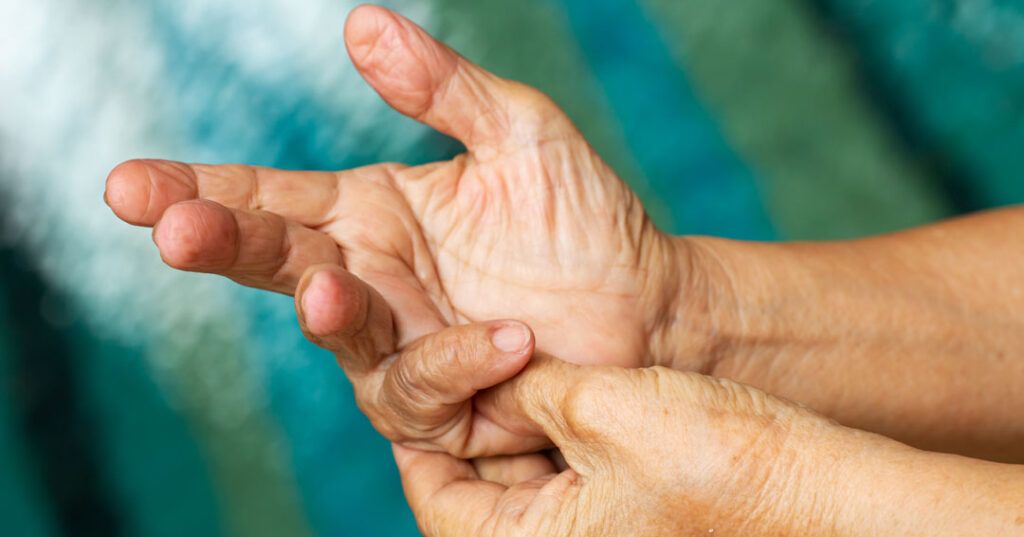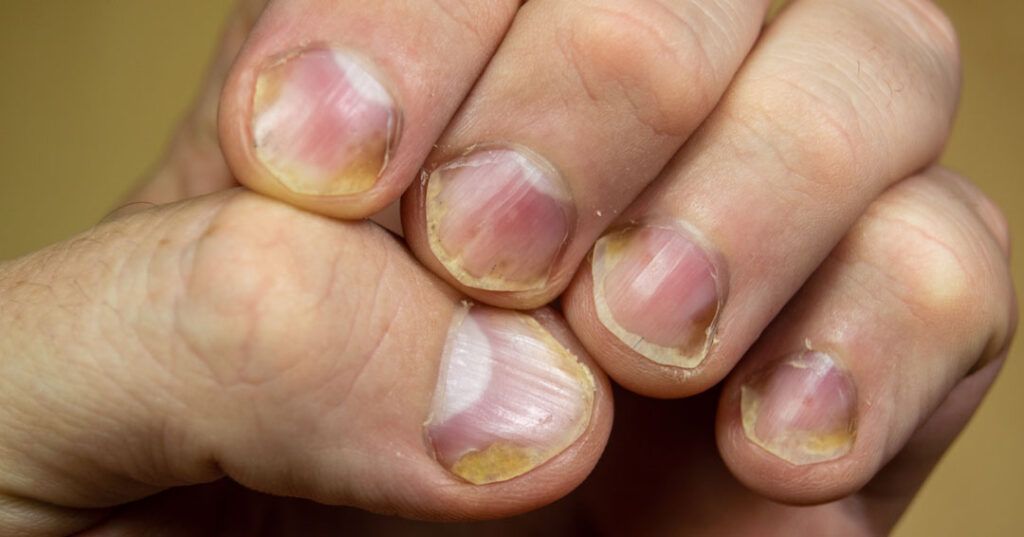Can You Get Psoriatic Arthritis in Your Fingers?
Updated April 02, 2024
Content created for the Bezzy community and sponsored by our partners. Learn More

Photography by Blue Collectors/Stocksy United
Psoriatic arthritis can cause painful swelling and stiffness in your fingers. Symptoms can affect your ability to grip and handle things, but treatment options can help.
If you’re experiencing finger swelling and have psoriatic arthritis (PsA), you may wonder if the two are related.
Psoriatic arthritis can cause joint pain, swelling, and stiffness throughout your body, including your fingers. It’s common in the small joints of fingers and toes, especially the finger joints closest to your nails.
You may experience stiffness and decreased range of motion in your fingers. But there are steps you can take to treat symptoms.
Here’s what you need to know about how PsA can affect your fingers and what you can do to manage symptoms.


How can PsA affect your fingers?
Psoriatic arthritis can cause pain and stiffness in joints throughout your body. When your fingers are affected, you may experience:
- pain and heat that radiates through your entire finger
- redness in your affected fingers
- stiffness that can make it difficult to bend your fingers
- stiff fingers that are worse in the morning or after other long periods of rest
- decreased range of motion that can cause difficulty with everyday movements, such as grasping and holding objects
- swelling in the affected fingers, which can cause a “sausage-like” appearance
- psoriasis skin patches around your hands, or on top of the affected finger joints
PsA tends to affect joints asymmetrically. This means you might experience symptoms on one hand and not the other.
Swelling (dactylitis)

Up to almost 50% of people with PsA experience dactylitis, a type of severe and uniform swelling also called “sausage fingers” that can also occur in the toes.
Dactylitis can be short term or chronic, and your fingers may be swollen and tender.
My sausage digits have returned to normal after starting prednisone, methotrexate, and a biologic.
— Megan617, Bezzy PSA member
Trigger finger

“Trigger finger” refers to inflamed tendons in your fingers that cause your finger to get stuck in a downward position (like pulling a trigger).
You can often manually straighten the finger, but it tends to curl back in overnight. You might also experience stiffness and pain.
My fingers lock every morning after I’ve been using them a lot the day before. There are many physical therapy exercises online to help strengthen your hands and improve finger dexterity.
— Pitac, Bezzy PSA member
Fingernail psoriasis

Both psoriasis and PsA affect the nails. This can cause:
- nail pitting
- crumbling or brittle nails
- fingernails that separate from their nail beds
- brown, white, or yellow discoloration
- white spots on your nails
- blood underneath the affected nail
How to manage symptoms of PsA in your fingers
Treating PsA in the fingers involves the same medications used to treat arthritis in other parts of the body. This includes:
- Nonsteroidal anti-inflammatory drugs (NSAIDs): Over-the-counter NSAIDs, such as ibuprofen, may help relieve pain and swelling in your fingers.
- Corticosteroid injections: If pain and swelling don’t improve with NSAIDs, a doctor may try a low dose steroid injection to help decrease the underlying inflammation in your finger joints.
- Biologics: Used for more severe PsA, these injections work by targeting your immune system to decrease inflammation.
- Disease-modifying antirheumatic drugs (DMARDs): Also used for more severe cases of PsA, these oral medications suppress your immune system in order to control the inflammation caused by PsA.
Physical therapy can also help improve finger joint functioning, and occupational therapy can help you navigate everyday activities more comfortably.
I read on a Kindle to avoid hand strain from holding a book, buy pre-chopped veggies, and wear compression gloves a lot. I try to space out my typing tasks at work, too.
— Megan617, Bezzy PSA member
You may also want to explore home remedies for relief. Applying a cold compress, taking an Epsom salt bath, and wearing compression gloves may help.
Wearing Copper Fit gloves to bed at night is the best technique I’ve found to have finger and hand mobility without locking in the mornings.
— Pitac, Bezzy PSA member
While hand exercises can help with PsA symptoms, a doctor may recommend avoiding unnecessary strain on your finger joints whenever possible. For example, you might use your body weight to push open a door, rather than your fingers only.
How to treat psoriasis in your fingernails
If you’re dealing with psoriatic nails, there are a few treatment options. Treating nail symptoms caused by PsA or psoriasis may involve:
- topical or injectable corticosteroids
- laser treatments
- medications such as biologics, DMARDs, or immunosuppressants
It may take 6 months to see results while you wait for your nails to grow.
Takeaway
If you’re experiencing ongoing pain, swelling, or stiffness in your fingers, it’s important to see a doctor for diagnosis and treatment. Psoriatic arthritis may cause your fingers to swell and fingernails to pit.
Following your PsA treatment plan and using home remedies like cold therapy can reduce inflammation and relieve swelling and pain.
It can also be helpful to connect with others who have PsA. The Bezzy PsA community understands what you’re going through and is here for you.
Originally written February 24, 2023
Medically reviewed on April 02, 2024
9 Sources


Like the story? React, bookmark, or share below:
Have thoughts or suggestions about this article? Email us at article-feedback@bezzy.com.
About the author